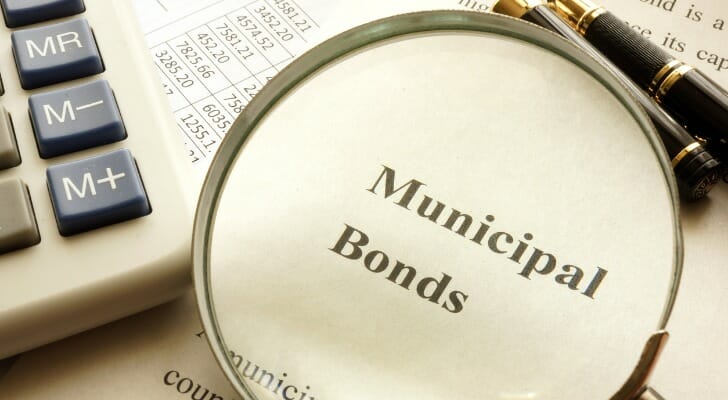 With proposed legislation to raise income taxes and capital gains taxes circulating in Washington, D.C., municipal bonds have become an attractive option for investors seeking tax-free income and low risk investments for their portfolios. However, it’s important to note that rising interest rates and credit perils can pose serious risks, particularly when it comes to high-yield bonds. In 2021, municipal bonds and ETFs have attracted more investments than any other time in the last 25 year. But is this the right investment for you? A financial advisor could help you decide on a bond strategy for your portfolio. Here’s what you need to know before investing.
With proposed legislation to raise income taxes and capital gains taxes circulating in Washington, D.C., municipal bonds have become an attractive option for investors seeking tax-free income and low risk investments for their portfolios. However, it’s important to note that rising interest rates and credit perils can pose serious risks, particularly when it comes to high-yield bonds. In 2021, municipal bonds and ETFs have attracted more investments than any other time in the last 25 year. But is this the right investment for you? A financial advisor could help you decide on a bond strategy for your portfolio. Here’s what you need to know before investing.
What Are Municipal Bonds?
Municipal bonds function like any other type of bond, though they’re issued by state governments, municipalities or county governments. These organizations sell municipal bonds as a way to raise capital for expenditures like new roads, public transit, social programs and more. They are essentially loans that you make to a government entity in exchange for interest payments.
However, one of the most important differences between municipal bonds and other types of bonds or fixed-income investments is that municipal bonds grow tax-free. Holders of municipal bonds aren’t just exempt from paying federal income taxes on their gains, they’re also usually exempt from all state and local taxes. There aren’t many investments out there that can truly grow tax-free.
It’s also worth noting that municipal bonds fall into two main categories: general obligation bonds and revenue bonds. General obligation bonds are used to cover general expenses and then repaid by tax revenue. Revenue bonds are used to pay for specific projects, say a toll road, and then repaid using revenue from the project itself.
Why Are Municipal Bonds Popular?
As noted before, municipal bonds are a popular investment due to the fact that you’re unlikely to owe any taxes on your earnings. While they earn at relatively low rates when compared with the stock market, for example, they are a popular option for wealthy investors who are looking for a way to generate extra cash flow.
Municipal bonds are quite popular. In fact, municipal bond mutual funds and municipal bond exchange-traded funds (ETFs) have attracted more than $88.5 billion in 2021 alone. That’s more than in any comparable time period in the past 25 years. All that said, it’s not like municipal bonds are a niche investment.
Potential Drawbacks of Municipal Bonds

As is the case with any investment, municipal bonds come with a certain level of risk. It’s easy to figure out the rating of any bond, as credit risk levels are assigned by third parties and range from AAA all the way down to D, or defaulted bonds. You should pay close attention to the credit rating of any bond before you buy it, and you should also remember that there are default risks no matter what the rating is. However, the default rate on municipal bonds is far lower than it is for corporate bonds.
Call risk is also associated with buying municipal bonds. In certain cases, the bond issuer will repay a bond before the maturity date. You’ll still get the premium, but your income stream will end prematurely in such a case. You’ll also want to be wary of market risk, as the value of your bond will drop if interest rates rise. In such a scenario, you might lose money if you decide to sell your bond before it reaches maturity.
Should You Invest in Municipal Bonds?
As is the case with any financial product or instrument, whether you should invest is ultimately up to you and will depend on your financial situation, goals and other factors. However, it’s worth taking a look at the overall economic environment before deciding to invest in municipal bonds or any fixed-income investment products.
We’re currently in a low-interest rate environment with lots of talk of raising both income taxes and capital gains taxes. While low interest rates don’t make municipal bonds an attractive investment, higher taxes certainly do. What’s more is that certain municipalities are still issuing high-yield bonds in this environment.
However, if interest rates rise in the near future, which they certainly may, municipal bonds purchased now may lose their value. It’s important to remember that you’ll still get your interest payments as outlined in the initial terms of the bond, but in a higher interest rate environment, you may be more interested in other investment or higher-yield bonds. In that case, your lower-interest bond could be worth less, should you decide to sell it.
Bottom Line

Municipal bonds haven’t always been a popular investment, but recently they’ve emerged as a great fixed-income investment, especially for wealthy investors who are looking to avoid tax obligations while generating additional revenue streams. However, just because they’re popular right now doesn’t mean that they’re right or you. As is the case with any investment, municipal bonds don’t come without certain risks. Make sure that you take note of the credit rating of a municipal bond, and make sure that they fit in with you portfolio and long-term investment goals before investing.
Tips for Investing
- There are many different assets classes out there to invest in, and it can be difficult to figure out which ones are right for you. A financial advisor can provide some help. Finding a qualified financial advisor doesn’t have to be hard. SmartAsset’s free tool matches you with up to three financial advisors in your area, and you can interview your advisor matches at no cost to decide which one is right for you. If you’re ready to find an advisor, get started now.
- If you’ve decided to craft your investment portfolio alone, you should make sure you’re prepared. SmartAsset has you covered with a number of different online investment resources to help you figure things out. Check out our free asset allocation calculator today.
Photo credit: ©iStock.com/primeimages, ©iStock.com/designer491, ©iStock.com/Maximusnd